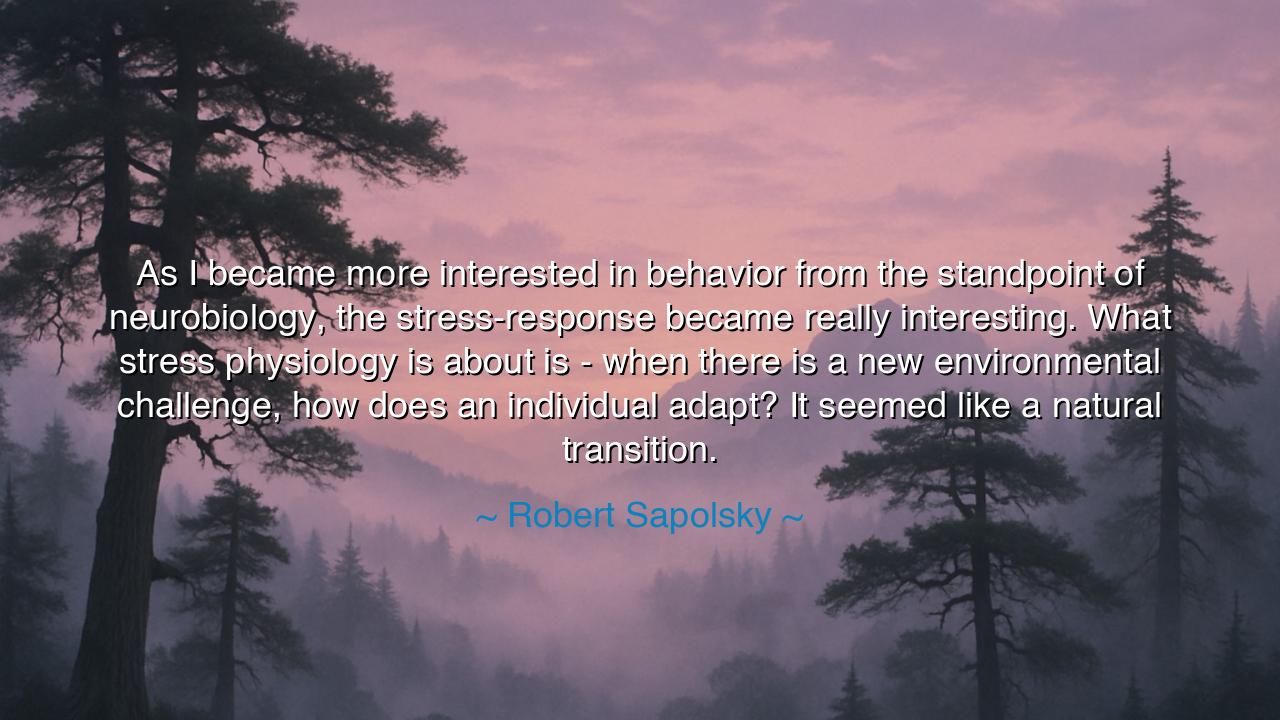
As I became more interested in behavior from the standpoint of
As I became more interested in behavior from the standpoint of neurobiology, the stress-response became really interesting. What stress physiology is about is - when there is a new environmental challenge, how does an individual adapt? It seemed like a natural transition.






The words of Robert Sapolsky—“As I became more interested in behavior from the standpoint of neurobiology, the stress-response became really interesting. What stress physiology is about is — when there is a new environmental challenge, how does an individual adapt? It seemed like a natural transition.”—are the reflection of a scientist who gazes not only upon the workings of the body but upon the mystery of survival itself. In his words is the ancient tension between the mind and the world, between the challenge of life and the resilience of the soul. To Sapolsky, stress is not merely a burden or affliction; it is the crucible in which adaptation, learning, and evolution are forged. His insight transforms the chaos of suffering into the wisdom of endurance.
The origin of this quote lies in Sapolsky’s lifelong study of stress physiology and behavior, fields in which he has been both pioneer and philosopher. For decades, he observed the lives of baboons in the plains of East Africa, documenting how hierarchy, fear, and conflict shaped their health and lifespan. What he discovered became one of the cornerstones of modern biology: that stress, when chronic or unmanaged, erodes the body and the mind—but when faced with courage and balance, it becomes the teacher of adaptation. His shift from general behavior to the neurobiology of stress was not an academic choice—it was the natural unfolding of curiosity about how living beings transform hardship into wisdom.
To the ancients, this principle was already known, though expressed in myth and metaphor rather than neurons and hormones. The Greeks spoke of Heracles, who became immortal not through comfort, but through twelve impossible labors. The Buddha taught that suffering is the first noble truth, for only by understanding its nature can one transcend it. The Stoics, too, believed that adversity is the sculptor of the soul. In the same way, Sapolsky’s scientific wisdom echoes the spiritual wisdom of old: the body and the mind are instruments tuned by challenge, and stress is the musician that tests their limits. What matters is not the chaos itself, but the grace with which we respond to it.
History offers countless illustrations of this truth. When Charles Darwin sailed on the HMS Beagle, he faced storms, hunger, and the disorientation of the unknown world. Yet those very stresses sharpened his mind, awakening in him the insight of adaptation, the recognition that all life survives through its ability to change. Sapolsky’s work stands upon this same foundation: that every creature, whether a baboon, a bird, or a human being, must answer life’s constant question—Will you adapt or break? The stress-response is nature’s ancient answer, the dance between survival and surrender, between rigidity and resilience.
But Sapolsky also teaches that stress is a double-edged sword. The same flame that tempers steel can consume it. In modern life, the human body—shaped for brief moments of danger—now endures endless waves of invisible threat: deadlines, expectations, the hum of cities that never sleep. We have learned to outrun predators, but not to escape anxiety. Sapolsky’s studies reveal that when the stress-response becomes unending, it transforms from teacher to tyrant, from adaptation to illness. Thus, the challenge of the modern soul is not to avoid stress, but to learn again the ancient art of balance—to engage when the storm comes, and to rest when it passes.
From his wisdom, we may learn a great lesson: that growth requires friction, but peace requires recovery. The wise do not curse challenge; they prepare for it. They do not flee discomfort; they observe it and learn its rhythm. Like the athlete who trains through strain, or the tree that grows stronger in the wind, we, too, must learn to let stress refine, not destroy, our nature. The one who meets life’s trials with understanding becomes not a victim of change, but its master.
Therefore, let this teaching endure: stress is not the enemy of life, but its proving ground. It is the forge through which the spirit strengthens its will, the moment in which biology becomes philosophy. To live well is to recognize the pulse of the stress-response within us—not as a curse, but as an inheritance from all who have survived before us. The challenge will always come; the environment will always shift. What defines us is not the storm, but how we stand within it. And in that standing—in that adaptation—lies the secret of both endurance and enlightenment.






AAdministratorAdministrator
Welcome, honored guests. Please leave a comment, we will respond soon